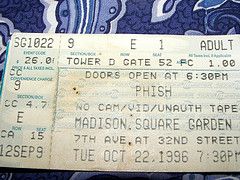
Is Ticket Scalping Fair?
Parents are complaining about the high price of tickets for Hannah Montana/Miley Cyrus concerts thanks to scalpers. Like any popular event, whether a concert or sporting event, ticket brokers buy tickets early on — somehow — and resell them with a huge mark-up. Is it fair? I don’t think so, but not for the typical reason.
 If scalpers who sell on StubHub or any number of other locations price tickets high on a large scale, it’s because there are enough people willing to pay that price. When event is “sold out” — that is, all the tickets were sold to an original buyer, some of whom may be brokers who have the tickets available in their own marketplace — prices of available tickets can be increased even further. Event promoters are missing out by not pricing the tickets as high as the market will bear. As it is now, with official below-market prices, the market that is created for scalpers ensures that performers will not maximize their income from tickets.
If scalpers who sell on StubHub or any number of other locations price tickets high on a large scale, it’s because there are enough people willing to pay that price. When event is “sold out” — that is, all the tickets were sold to an original buyer, some of whom may be brokers who have the tickets available in their own marketplace — prices of available tickets can be increased even further. Event promoters are missing out by not pricing the tickets as high as the market will bear. As it is now, with official below-market prices, the market that is created for scalpers ensures that performers will not maximize their income from tickets.
The problem here is that it is possible that scalpers artificially manipulate the market by swooping in early and purchasing all the good tickets. They control the supply, rather than the event promoters. Thus, the demand for more poplar events isn’t matched by the scarce supply, and the scalpers can raise their prices to unreasonable levels.
So what happens? Event promoters raise their prices to match the new market, and a cycle ensues. The market allows ever increasing prices, far beyond the increase of inflation. People who aren’t used to trying to get tickets to popular events, like Paige Nace in the article, are frustrated at the expense.
It’s just another financial choice you have to make. Is your daughter’s happiness for one evening — and possibly the resulting memories — worth the several hundred dollars you’ll have to spend for two tickets? I have no problem seeing people spend money for musical entertainment, though sometimes the said entertainment is of questionable quality when considered by individuals with musical taste and is more about theatrics than actual musical entertainment. Live events are always much more engaging than sitting in your living room watching a DVD or listening to a CD. But it’s better when attendance can be accomplished without middlemen.
Photo credit: JOE MAD


Article comments
This is a good article on the fairness of ticket scalping. There will always be great tickets available come showtime Flexo. I feel so strongly about the secondary ticket market that I wrote a book on the subject. Please don’t publish this comment. I wrote it so that I may contact you and send you a free copy of my book. There are countless opportunities for fans! I will be at the Hannah Montana Concert in LA on Nov. 7 with my 7 year old son and I will score 2 tickets for less than $100 bucks. No doubt! You can check it out at http://www.thepoormansticket.com Send me your mailing address and I will mail a copy of my book right out. Continued success and I am sure I will see your income grow to over a half million within a few short months.
If anything, sites like eBay and StubHub brought this business to the forefront, by showing “regular people” how much money they could get for their tickets. Now, you’ve got college kids and soccer moms competing with ticket brokers on the open market, and there’s even less supply to go around for everyone else..
It’s perfectly fair. They have tickets, and other people want them. It is called market equilibrium. When a product is priced below the natural equilibrium, there is a gap between what people are willing to pay, and the going price. Some one with enough resources buys the tickets, and let’s the market determine how much to charge.
This is the exact same concept used in arbitrage of any sort. It is what happens with auctions, too.
I actually think that venues should price more appropriately for really popular shows/games. I rather have the people putting on the show or the game receive more money than a middleman.